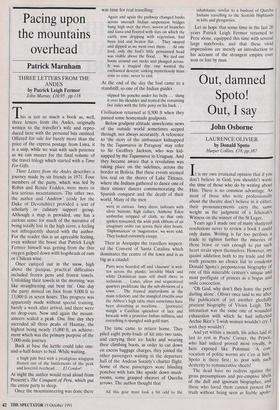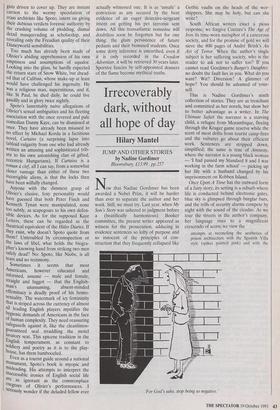Out, damned Spoto!
Out, I say
John Osborne
LAURENCE OLIVIER by Donald Spoto Harper Collins, 178, pp.387 It is my own irrational opinion that if you don't believe in God, you shouldn't waste the time of those who do by writing about Him. There is no common advantage. As most of those who write professionally about the theatre don't believe in it either, their pronouncements carry the same weight as the judgment of a Jehovah's Witness on the winner of the St Leger. Years ago I made one of many shattered resolutions never to review a book I could only damn. Writing is far too perilous a trade to tighten further the miseries of those brave or vain enough to put such heart strain upon themselves. However, my quaint addiction both to my trade and the truth presents no choice but to condemn Donald Spoto's preposterous biography of one of this miserable century's unique and most profligate of princes as a bogus and anile concoction.
'Oh God, why don't they leave the poor darling alone', Olivier once said to me after the publication of yet another gleefully prurient biography of Vivien Leigh. The intonation was the same one of wounded exhaustion with which he had inflected Archie Rice's 'I wish women wouldn't cry. I wish they wouldn't'.
And yet within a month, his ashes laid at last to rest in Poets' Corner, the Prince. who had indeed proved most royally, is here exposed like Polonius: 'A con- vocation of politic worms are e'en at him. Spoto is there first ; to post with such dexterity to remunerative sheets!
The dead have no redress against the gross presumptions and pre-emptive libels of the dull and ignorant biographer, and those who loved them cannot protest the truth without being seen as feeble apolo- gists driven to cover up. They are instant carrion to the wormy speculation of crass archivists like Spoto, intent on giving their dubious verdicts forensic authority by the crushing volume of plodding, dismal detail masquerading as scholarship, and revealing only the Freudian quality of their Disneyworld sensibilities.
Too much has already been made of Olivier's abiding apprehension of his own emptiness and assumptions of squalor. Looking into the glass, he hardly expected the return stare of Snow White, but dread- ed that of Caliban, whose make-up at least would have challenged his ingenuity. He was a religious man, superstitious, and if, like St Paul, he died daily, he could live gaudily and in glory twice nightly.
Spoto's lamentably naive allegations of Olivier's sexual ambiguities and his fleeting association with the once revered and pale comedian Danny Kaye, can be dismissed at once. They have already been misused to no effect by Michael Korda in a factitious novel, Curtains (a surprising lapse into tabloid vulgarity from one who had already written an amusing and sophisticated trib- ute to his own astonishing clan of gifted, eccentric Hungarians). If Curtains is a roman a clef, all I can say, from a somewhat closer vantage than either of these two incorrigible aliens, is that the locks then have been wilfully changed.
Anyone with the dimmest grasp of Olivier's elusive, foxy personality would have guessed that both Peter Finch and Kenneth Tynan were manipulated, none too subtly, as scapegoats to his own defen- sible devices. As for the supposed Kaye Letters, these can be regarded as the theatrical equivalent of the Hitler Diaries. If they exist, why doesn't Spoto quote from them? Untroubled by circumspection or the laws of libel, what holds the biogra- pher's knowing hand from striking two men safely dead? No: Spoto, like Niobe, is all tears and no testimony.
Sometimes it seems that most Americans, however educated and informed, assume -- male and female, straight and faggot — that the English- man's unassuming, absent-minded effeminacy is deadly proof of his homo- sexuality. The watermark of icy femininity that is striped across the currency of almost all leading English players mystifies the hYgienic demands of Americans in the face of human complexity. They need reassuring safeguards against it; like the cleanliness- guaranteed seal straddling the motel lavatory seat. This epicene tradition in the English temperament, as constant to soldiery and poetry as it is to the play- house, has them bamboozled.
Even as a tourist guide around a national monument, Spoto's book is myopic and
isleading. His attempts to interpret the inaccessible ironies of English social life are as ignorant as the commonplace exegeses of Olivier's performances. I seriously wonder if the deluded fellow ever actually witnessed one. It is as 'unsafe' a conviction as any secured by the bent evidence of an eager detective-sergeant intent on getting his pet terrorist sent down. All this transatlantic nonsense will doubtless soon be forgotten but for one thing: the glum persistence of future pedants and their bemused students. Once some dotty inference is unearthed, even if it is only recorded in the Croydon Advertiser, it will be retrieved 30 years later. Sportive fancies by self-appointed dousers of the flame become mythical truths.



























































 Previous page
Previous page